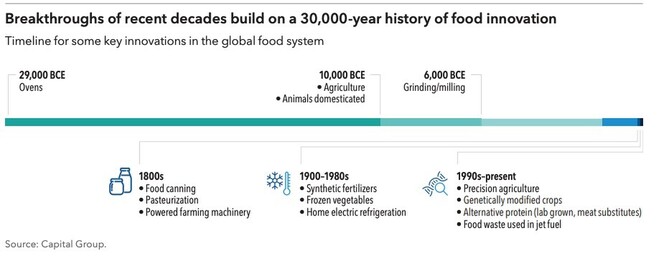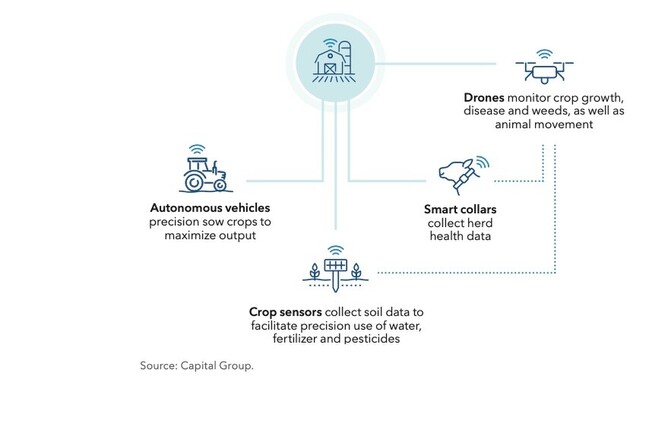The world's population is expected to reach nearly 10 billion by 2050 (8.178 billion now), and it is estimated that this will create a 56% food gap in calories produced versus those required.
The changing climate (heat, rain, wind, drought), along with conflict are producing additional pressures on food supply. Our food systems account for up to 1/3 of greenhouse gas emissions, 80% of biodiversity loss and consumption of 70% of available freshwater according to UN estimates.
The traditional methods of dealing with the production of food are increasingly becoming less viable (factory farming, deforestation, growing use of synthetic fertilisers). Decades of intensive farming and use of chemical fertilisers have resulted in soil and land degradation, impacting crop yields for farmers.
Changes in dietary preferences and health consciousness including sustainable and ethical food choices and more plant based foods.
As a consequence of all these factors, the agricultural industry needs to increase its productivity - even as things get tougher to do so.
Capital have identified six areas of innovation, which have built on a 30,000 year history of food innovation, and they are looking at investments in each of these areas:
Seed innovation
As arable land is likely to reduce in the future, seed innovation aims to improve crop resilience or enhance nutritional value, typically using things like genetically modified and genetically edited foods. Regulations (including in New Zealand) are being reviewed as technology is getting better, but ther are still some health and biodiversity concerns that continue to be debated.
Lower impact fertilisers
Chemical fertilisers and pesticides took over from manure (used for the previous 8,000 years). The key nitrogen-based fertilisers have been not only incredibly energy-intensive, but also has an output of nitrous oxide during it's lifecycle which has a global warming potential of more than 250 times that of Co2 and stays in the atmosphere for more than 100 years on average and the fertilisers can also produce polluted water.
Although the development of fertlisers and agriculture practices that lower greenhouse gas emissions is still at tis beginning, use of things like engineered microbes, slow-release nitrogen and targeted application technologies are showing promise for the next wave of fertiliser and promising areas of investment.
Precision agriculture
This is the practice (already being used) of farmers optimising their operations with geolocation, sensors, robotics, drones and software. Adding AI into the process could drive even more efficient resource allocation and yield improvements.
Regenerative farming
This is an outcome-based approach which, through cover crops, multi-cropping and elimination of inorganic pesticides and fertilisers, improves the soil health, biodiversity and climate impact of agriculture. This approach also includes the minimising of tilling of land, which helps keep carbon dioxide trapped in the soil.
Nestle is one of the companies that is helping move regenerative farming into the mainstream. See our blog article from 2022 about this here https://www.moneyworks.co.nz/blog/post/80853/nestle-and-child-labour/
Alternative Proteins
Demand for meat substitutes has grown at six times the rate of conventional animal meat since 2014. Over the same period, dairy substitutes have grown at double the rate of conventional dairy. However, as emerging market countries get wealthier, the demand for conventional meat products continues to grow as well.
The Good Food Institute esimtates that, at the end of 2022, more than 150 companies were focused on developing cultivated meat.
Waste management and reduction
40% of food that is grown each year is never eaten - contributing toward an estimated 2.5 billion metric tons of wastage each year (World Wildlife Fund). This in turn accounts for 10% of consumer-related Greenhouse Gas Emissions.
Recycling and reuse of waste from the food indstury is garnering significant attention. Food waste is poised to become a much more widely used input (feedstock) for alternative proteins, animal feed, fertilisers, biofuels, bioplastics and even clothing.
Food waste is part of inputs into a circular economy which can fulfil many goals, from reducing GHG emissions to reducing pollution, and eventually the costs related with waste produce.
If you would like to read the full research paper - email us here at contact@moneyworks.co.nz and we will send it to you.



